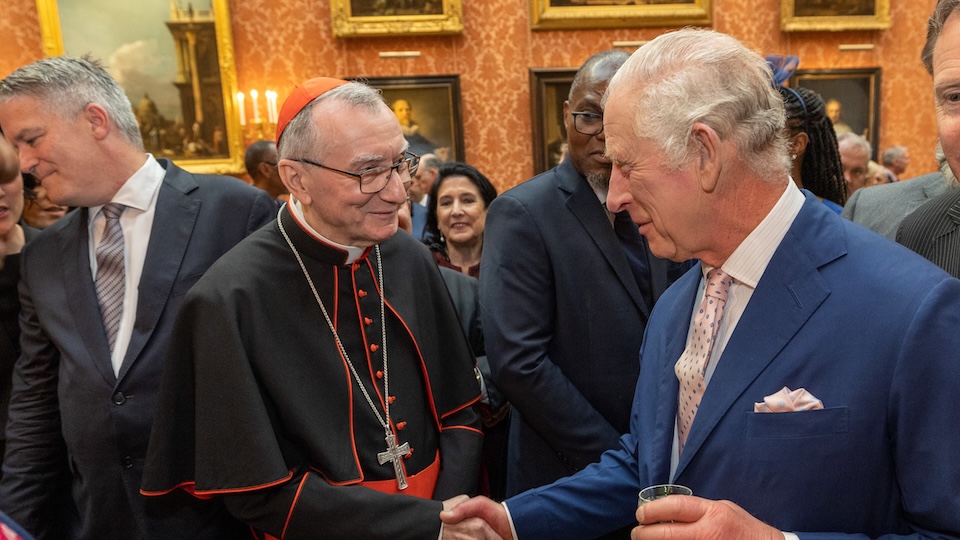

Holy See in Dubai: Taking action on Climate Change
Matthew Neugebauer
Saturday, November 25, 2023

Vatican Secretary of State Cardinal Pietro Parolin greets King Charles III in Buckingham Palace in May, 2023. Cardinal Parolin will be travelling to Dubai this weekend to attend the COP28 UN conference on climate change. Wikimedia Commons.
While Pope Francis can't make it to Dubai this weekend, Secretary of State (Pope Francis' right-hand-man) Cardinal Pietro Parolin will go in his stead, the Holy See Press Office has indicated. He'll give an address at the conference on December 2, and confirm the Catholic Church’s continued commitment to the multilateral task of caring for our common home and undoing the effects of climate change. An interfaith declaration of this commitment will be presented at the conference; Parolin signed it as Pope Francis' representative at a faith leaders' summit in early November. On December 3, he'll be joined by Cardinal Ayuso Guixot, prefect of the Dicastery for Interreligious Dialogue, to inaugurate an interfaith pavilion with the Muslim Council of Elders and other faith leaders.
What is COP28?
“COP” stands for “Conference of the Parties,” with “parties” referring to countries and other legal entities that have formally agreed to a multilateral treaty or United Nations (UN) Convention. In this case, they are parties to the 1992 United Nations Framework Convention on Climate Change (UNFCCC), which commits signatories to concrete, measurable, and accountable efforts at the “stabilization of greenhouse gas concentrations in the atmosphere” in order to halt global warming, “allow ecosystems to adapt naturally to climate change, to ensure that food production is not threatened and to enable economic development to proceed in a sustainable manner” (Art. 2, emphasis added). The annual conference features a negotiating forum, a series of international regulatory bodies, educational events, and as mentioned above, an interfaith event.A Green Magisterium
As the name suggests, this will be the 28th annual Conference of the Parties. In previous years, popes and other church officials strongly encouraged action on climate change, but had to cheer on the COP’s efforts from the sidelines. Nevertheless, ecological issues have gradually but consistently moved to the centre of papal social teaching over the decades. St. Paul VI listed “the environment” among many emerging challenges in his 1971 Apostolic Letter Octogesima Adveniens. St. John Paul II began to draw attention to growing environmental concerns early in his papacy, and in 2001, called for all people to undergo an "ecological conversion" to a "rediscovered harmony with nature and with one another." In his 2008 social encyclical Caritas in Veritate, Pope Benedict XVI sounded the alarm about the spiritual roots of environmental decline, stating that "the environment is God's gift to everyone, and in our use of it we have a responsibility towards the poor, towards future generations and towards humanity as a whole" (#48). Jorge Mario Bergoglio chose the name "Francis" when he was elected pope in 2013, signaling that he would raise the volume even further. His landmark encyclical Laudato Si' was written in advance of COP21 in Paris in 2015, where parties signed a new watershed accord. The encyclical, which takes its name from a hymn of praise by St. Francis of Assisi, recovered the great 13th-century mystic’s holistic vision. The 21st century Pope Francis elevated environmental concerns from merely a "set of issues" to a whole way of understanding the vocation of the Church, the human family, and all of creation under the framework of "care for our common home." He echoes John Paul II’s call for an ecological conversion, “whereby the effects of [our] encounter with Jesus Christ become evident in [our] relationship with the world around [us]. Living our vocation to be protectors of God’s handiwork is essential to a life of virtue; it is not an optional or a secondary aspect of our Christian experience” (#217). He further explores this vocation to virtuous relationships with the whole of creation:[Ecological conversion] entails a loving awareness that we are not disconnected from the rest of creatures, but joined in a splendid universal communion. As believers, we do not look at the world from without but from within, conscious of the bonds with which the Father has linked us to all beings. By developing our individual, God-given capacities, an ecological conversion can inspire us to greater creativity and enthusiasm in resolving the world’s problems and in offering ourselves to God "as a living sacrifice, holy and acceptable" (Romans 12:1). We do not understand our superiority as a reason for personal glory or irresponsible dominion, but rather as a different capacity which, in its turn, entails a serious responsibility stemming from our faith. (#220)
What might Cardinal Parolin say at COP28?
The Holy See formally signed on to the UNFCCC on October 4 of last year, symbolically on the feast of St. Francis of Assisi. This was a significant development in the Catholic Church’s approach to ecology and climate change, putting more concrete meat on the intellectual bones of this “Green Magisterium.” The Holy See’s new status as a formal party might enable Parolin and others to directly take part in negotiations and urge governments and other bodies at this highest-level conference to step up their efforts to heal our planet. What might Parolin present as Pope Francis's message and goals at the conference? The Holy Father offered a strong indication in a follow-up letter to Laudato Si' called Laudate Deum, released this past October 4. (Deacon Pedro has featured the letter in his latest “Deacon-structing” reflection.) In the middle section of the brief message, he lists the partial success and more glaring failures of previous COP conferences, international declarations, and the global community to reverse the effects of climate change and develop a more holistic bond between both our human and non-human neighbours. Pope Francis ultimately concludes that governments and other leaders have fallen short of their commitments to healing our relationship with the planet. He leaves readers with a withering, prophetic rebuke of the power of corporate interests in charting the current course of human and ecological affairs: “‘Praise God’ is the title of this letter. For when human beings claim to take God’s place, they become their own worst enemies” (#73). The letter, explicitly aimed at the Dubai conference, signals the urgent tone that the Parolin will bring with him on this visit. However, while the letter ends on a sharp note, it fundamentally calls for the conference to embark on a renewed effort at harmony, an “energy transition” – that is, the shift from fossil fuels to sustainable resources – rooted in that deeper ecological conversion:Once and for all, let us put an end to the irresponsible derision that would present this issue as something purely ecological, 'green,' romantic, frequently subject to ridicule by economic interests. Let us finally admit that it is a human and social problem on any number of levels. [...] If there is sincere interest in making COP28 a historic event that honours and ennobles us as human beings, then one can only hope for binding forms of energy transition that meet three conditions: that they be efficient, obligatory, and readily monitored. This, in order to achieve the beginning of a new process marked by three requirements: that it be drastic, intense, and count on the commitment of all. (#58-59)
What might he do?
Clearly, Parolin will work to convince those in power to commit, decisively, to care for our common home in a way they haven’t thus far. His and Cardinal Guixot's involvement in the interfaith summit, for example, will offer a powerful witness that religious leaders see climate action as an important aspect of their faith commitments. Another way he can convince decision-makers is by backing up his talk with action. For example, he is arriving in Dubai with a set of concrete, freshly-made promises by Vatican City’s Governorate (effectively, its City Council) to increase environmental sustainability in all areas of the city’s life. This is but one example of the ways that Pope Francis, Cardinal Parolin and others have demonstrated their willingness to work alongside the international community and shown a stronger conviction that such measures are necessary. Now that the Holy See is a formal party to the UNFCCC, Parolin can remind leaders of these and other commitments at the conference from within the framework convention’s measurement and accountability mechanisms, rather than outside of them. He can speak for the actual, physical properties of the Holy See (such as Vatican City and various churches and other buildings throughout Italy), and more importantly on behalf of the expansive network of Catholic institutions, organizations, and movements throughout the world. At COP28, he’ll be able to say to world leaders, “we’re taking action: how about you?” Pope Francis, Cardinal Parolin, COP28 President Dr. Sultan Al Jaber, UN officials, and others clearly have high aspirations for this conference. They hope it signals a decisive energy transition that “leaves no one behind.” The extent to which they succeed remains to be seen, in part because the conference is being hosted and led by the UAE government. In Laudate Deum, Pope Francis raised the concern that many UAE officials are connected to oil interests in the country (#53), which might weaken the potential for a fresh commitment to a sustainable transition. However, one thing we know is that the Holy See’s active presence in Dubai as a formal party to the UNFCCC will ensure that Pope Francis and his successors will continue to lead the way to a deeper, mutually-enriching relationship with our common home. This article has been updated to reflect Cardinal Parolin's involvement.Related Articles:
<<
SUPPORT LABEL
$50
$100
$150
$250
OTHER AMOUNT
DONATE
Receive our newsletters
Stay Connected
Receive our newsletters

Stay Connected









